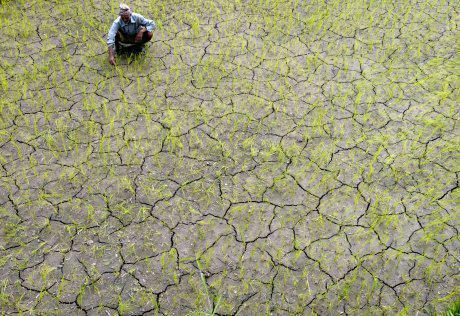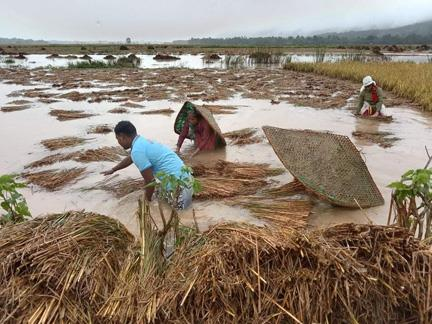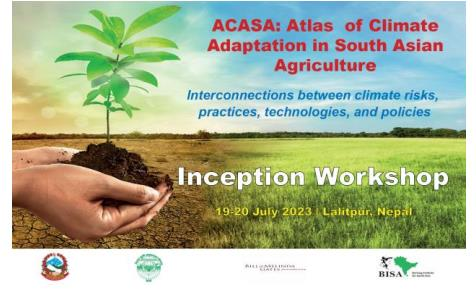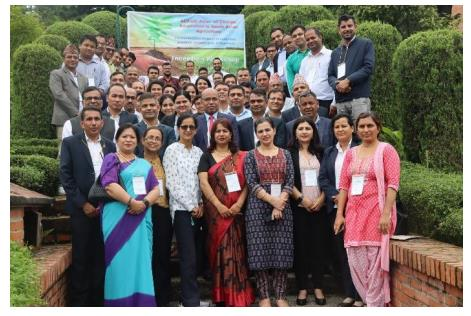An initiative to address climate change impacts on agriculture in Nepal
Amar Bahadur Pun, Chief, National Agricultural Environment Research Centre, Nepal Agricultural Research Council (NARC), NepalSunita Sanjyal, PhD, Scientist, National Pasture and Fodder Research Program, Nepal Agricultural Research Council (NARC), Nepal


Photo Credit: www.kias.org.np and www.nepalitimes.com
Agriculture is the mainstay of Nepalese economy. A majority of the country’s population (60%) is engaged in agriculture for their livelihood and the sector contributes about 36% of the GDP. In spite of this, Nepal has the most fragile and diverse geographical ecology, ranging from high mountains to hot plains which makes the country most vulnerable to climate risk and impact on agriculture.
Over last few decades, Nepal has been experiencing significant changes in temperature and precipitation patterns that constitutes a serious threat to agricultural production. The studies showed that atmospheric temperature in Nepal is rising at a rate higher than the global average, with a 1.8 C increase between 1975 and 2006, while precipitation has become increasingly unpredictable. Furthermore, increased frequency of extreme weather events has affected agriculture production. Evidence increasingly indicates that the developing country like Nepal may be more at risk from climate change. There is also evidence of more intense precipitation events, however, there is no reliable projection for the future. Besides, delayed monsoon including erratic rainfall pattern and prolong drought being prevailed during of last few years are some examples of climate change in Nepal. As a result, many visible impacts of climate change have been perceived on agriculture including water resources and biodiversity.
Climate change also poses the threat of pest outbreaks; as higher temperature speeds up the lifecycle of the insects so that population grows faster. Many outbreaks of fungal diseases such as late blight are related with the climate change. Cold water fish, pasture lands, and livestock are likely to be most at risk in Nepal because of climate change. Furthermore, the study reported that the yield of wheat, rice and maize has been reduced by 5.0%, 10.0% and 3.8% respectively due tocumulative effect of climate change in Nepal. Additionally, defective reproductive growth and increase in sterility, severity of diseases and insect pests are some negative consequences under increased temperature on rice production. Similar impacts are also perceived on livestock
production in many ways in Nepal, and occurrence of frequent extreme events associated with elevated temperature cause different implications on pasture and fodder resources, diseases and
parasitic pattern, abnormal reproduction, and reduced feed intake in livestock.
To tackle with such climate issues in agriculture production, Nepal Agricultural Research Council (NARC) has taken initiative for developing a South Asia Climate Adaptation Atlas for Agriculture in collaboration with the Borlaug Institute for South Asia (BISA-CIMMYT, India). The Atlas brings together and conforms South Asia data on evolving patterns of climate hazards, exposures, vulnerability, exposure, potential impacts on major agricultural commodities, and potential climate adaptation solutions. By integrating research findings, technologies and knowledge developed in the region, the project anticipates to develop an effective mitigation and adaptation solution of climate change impacts on agriculture. Consequently, the Atlas is expected to provide a set of tools for the investment targeting and priority setting to support the government, donor organizations and adaptation focused institutions in agricultural technologies, climate information services and policies. Furthermore, this comprehensive Atlas seeks to enhance agricultural resilience on climate change impact for the food security and prosperity of communities across South Asia through identifying adaptation solutions, exchanging knowledge and strengthening regional collaboration.

 Photos: Inception workshop of ACASA in Nepal
Photos: Inception workshop of ACASA in Nepal
